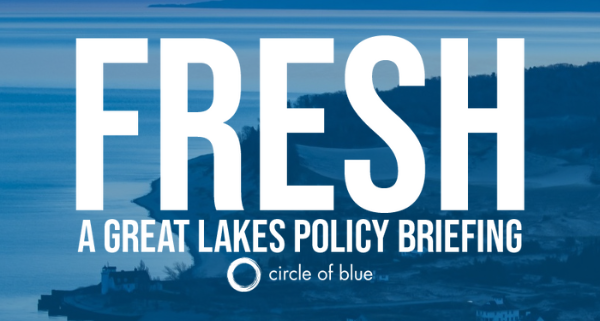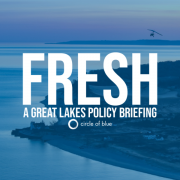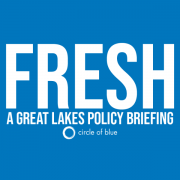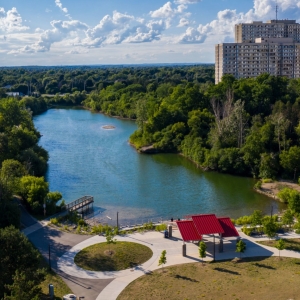FRESH, May 31, 2022: Summer To Bring Rising Electricity Rates, Blackouts to Great Lakes Region
May 31, 2022
Fresh is a biweekly newsletter from Circle of Blue that unpacks the biggest international, state, and local policy news stories facing the Great Lakes region today. Sign up for Fresh: A Great Lakes Policy Briefing, straight to your inbox, every other Tuesday.
— Laura Gersony, Fresh Editor
This Week’s Watersheds
- Minnesota moves to regulate pipelines transporting liquid carbon dioxide.
- Members of the Chicago City Council vote down an ordinance aimed at addressing water affordability.
- In the wake of a deadly storm, Ontario leaders talk climate policy on the campaign trail.
- Utilities warn of blackouts and rising electricity rates across the Great Lakes region this summer.
New York legislators may soon crack down on the state’s largest plastic manufacturers.
“We’re not the only ones who are tired of seeing plastic in our waterways, in our trees.”— Brian Langloss, a senior field representative for the conservation nonprofit Oceana.
The New York State Assembly is considering some of the most ambitious packaging reduction laws in the country, Grist reports. The legislature is weighing a bill that would require plastic manufacturers to halve their single-use packaging within 10 years, and force plastic producers to pay the cost of disposal and recycling. The bill also contains measures to transition manufacturers away from non-reusable packaging and ban the use of toxic “forever chemicals” known as PFAS. Another bill would expand New York’s “Bottle Bill,” which gives consumers several cents back for returning used bottles.
Fresh from the Great Lakes News Collaborative
- Water’s True Cost: A Photo Essay — Circle of Blue
- Federal legislation introduced aimed at preventing oil spills in the Great Lakes — Michigan Radio
- Ontario faces uneven investment in water infrastructure — Great Lakes Now
All month long, the Great Lakes News Collective has reported on the true cost of water in Michigan. Catch up on this 10 part series here.
The Great Lakes News Collaborative includes Bridge Michigan; Circle of Blue; Great Lakes Now at Detroit Public Television; and Michigan Radio, Michigan’s NPR News Leader. We work together to produce news and information about the impact of climate change, pollution, and aging infrastructure on the Great Lakes and drinking water. This independent journalism is supported by the Charles Stewart Mott Foundation. Find all the work here.
Minnesota Moves to Regulate Liquid Carbon Dioxide Pipelines
Minnesota utility regulators decided that pipelines carrying pressurized carbon dioxide are considered hazardous, and therefore require state approval, according to MPR News. Environmental and Indigenous groups cited several concerns when pushing the state to adopt regulatory authority. Carbon dioxide creates a corrosive acid if it comes into contact with water and if released into the atmosphere, it is a planet-warming greenhouse gas. Minnesota will now review the proposals of two companies which seek to capture carbon dioxide emissions from ethanol plants and store the substance underground in surrounding states.
- Why it matters: Pipelines are a perennial matter of controversy in the “land of 10,000 lakes,” where spills and construction risks can pose a threat to waterways. Last summer, Circle of Blue investigated the environmental risks of the Line 3 oil pipeline in northern Minnesota.
In the News
WATER AFFORDABILITY: Members of the Chicago City Council voted down a plan aimed at addressing water debt in the city, CBS News reports. The bill, known as the “Water for All Ordinance,” would have expanded Chicago’s billing relief program for low-income residents, prohibited the city from privatizing its water system, and permanently banned water shutoffs for Chicago residents who did not pay their water bills. Members of Mayor Lori Lightfoot’s administration objected to the cost of the program and called some of its deadlines “physically impossible.” Lightfoot put forth a similar ordinance earlier this year, though it is unclear if or when the plan will come up for a vote.
- Why it matters: Millions of Americans are in water debt. In 2020, Circle of Blue launched the most extensive investigation of water debt and its consequences ever conducted by a news organization in the United States. Chicago’s figures were among the steepest in the country, with city residents holding a total of $341 million in water debt.
CLIMATE POLICY: After a deadly storm last weekend, leaders of Ontario’s main political parties are discussing their climate plans on the campaign trail, Global News reports. The storm took 10 lives and plunged thousands into electrical blackouts. With Ontario’s June 2 election rapidly approaching, incumbent premier Doug Ford is emphasizing electric vehicle manufacturing and clean steel production. Leaders of the progressive New Democrat and Liberal parties have advanced plans to slash emissions in the coming decades and invest in resilience strategies such as erosion control.
Looking Ahead
A GRIM FORECAST: Electricity prices are on track to rise across the Great Lakes region this year, with rates increasing by 6 percent in the Midwest and 15 percent in New England compared to 2020. Inside Climate News reports that the shift is due in large part to higher prices for natural gas, the main fuel used for electric power plants. Prices surged after Russia’s February invasion of Ukraine. The news comes as grid operators in the Midwest warn customers that they may experience blackouts at times of high demand.
Other News
Laura Gersony covers water policy, infrastructure, and energy for Circle of Blue. She also writes FRESH, Circle of Blue’s biweekly digest of Great Lakes policy news, and HotSpots H2O, a monthly column about the regions and populations most at-risk for water-related hazards and conflict. She is an Environmental Studies and Political Science major at the University of Chicago and an avid Lake Michigan swimmer.











Leave a Reply
Want to join the discussion?Feel free to contribute!